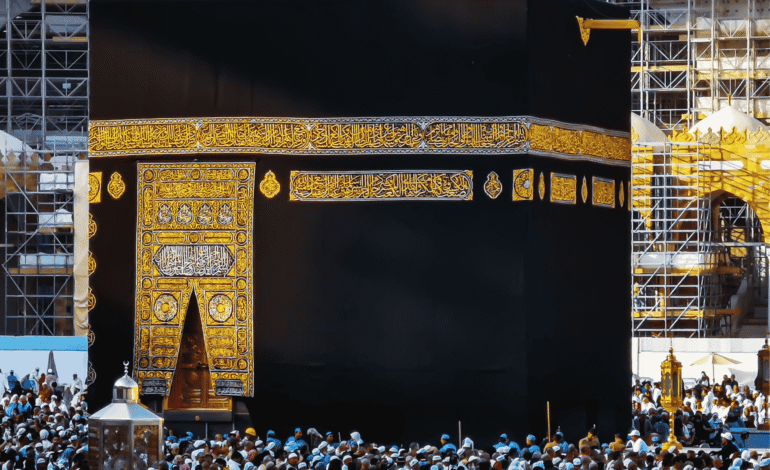As the sacred pilgrimage of Hajj draws near, the Kingdom of Saudi Arabia’s Ministry of Hajj and Umrah has reinforced a crucial requirement for the 1446 AH season: obtaining an official Hajj permit. This mandate is not merely a procedural obligation but a critical part of maintaining safety, organization, and the spiritual integrity of the pilgrimage. With millions of Muslims expected to travel to the holy cities of Makkah and Madinah, the enforcement of this regulation ensures the pilgrimage remains a secure and spiritually uplifting experience for everyone involved.
The Hajj pilgrimage, one of Islam’s five pillars, attracts Muslims from across the globe. While it remains a deeply personal spiritual journey, the logistical demands of hosting millions in a short span require careful planning and regulation. The permit requirement stands as a cornerstone of this effort, protecting the health and safety of pilgrims and ensuring smooth execution of the religious rituals.
Why the Official Hajj Permit Is Essential
The obligation to obtain an official Hajj permit is driven by both spiritual and logistical imperatives. Every year, millions converge on the holy sites during Dhul Hijjah, creating intense pressure on infrastructure, healthcare, and crowd management systems. The permit system helps regulate pilgrim numbers and ensures that only eligible individuals participate.
Saudi authorities use the permit process to manage accommodation, transport, and medical services. The system is designed to prevent overcrowding and ensure that essential services are distributed equitably. By requiring permits, the Ministry can plan operations with accuracy and safeguard public health.
From a religious perspective, the regulation aligns with Islamic principles of order, safety, and mutual respect. The Prophet Muhammad (peace be upon him) emphasized the importance of avoiding harm to others, making this regulation a necessary extension of Islamic ethics during mass gatherings.
Strict Legal Penalties for Violations
To protect the sanctity and safety of the pilgrimage, Saudi Arabia is enforcing strict legal penalties for those attempting to perform Hajj without a valid permit. Offenders may face heavy fines, deportation, and bans on future pilgrimages.
Authorities will establish security checkpoints at key entry points into Makkah and surrounding areas to verify the authenticity of permits. Unauthorized individuals will be detained, and legal proceedings will follow. Anyone assisting violators—including drivers, guides, or accommodation providers—will also be held accountable.
These measures are not punitive for their own sake; rather, they aim to prevent overpopulation in sacred areas, which can lead to tragic outcomes. By maintaining strict control, the Ministry hopes to create a safe and spiritually enriching environment for legitimate pilgrims.
Digital Application Process Simplifies Access
The Ministry of Hajj and Umrah has implemented a fully digital process for obtaining permits, making the experience smoother and more accessible. The “Nusuk” platform, launched by Saudi Arabia, serves as a comprehensive digital gateway for pilgrims to apply for Hajj, book services, and access guidance.
To receive a Hajj permit, applicants must meet health and documentation requirements. These include vaccinations, identity verification, and in some cases, age and fitness eligibility. Through these digital platforms, pilgrims can access approved tour operators and travel agencies, eliminating the risks associated with unauthorized brokers.
The digital infrastructure also ensures transparency and provides real-time tracking and updates for each pilgrim. This has significantly reduced instances of fraud, lost paperwork, and communication breakdowns. It also enhances coordination between government agencies and private service providers.
Health and Safety Planning Through Regulation
Managing the safety of millions of pilgrims requires strategic planning. One of the most effective tools in Saudi Arabia’s public health and crowd control strategy is the permit system. It allows authorities to predict and manage crowd density at every site, from the Grand Mosque to Mina, Arafat, and Muzdalifah.
Historical events have underscored the dangers of overcrowding during Hajj. In response, the Ministry has invested in infrastructure and technological solutions that rely heavily on accurate data. Pilgrims with permits are entered into a centralized database used to allocate emergency services, health teams, and transport routes.
By excluding unauthorized individuals from the process, the Ministry protects not only those without permits but also the larger pilgrim population. A regulated environment ensures that emergency response, sanitation, and healthcare resources are not overwhelmed during peak rituals.
Spiritual Education and Structured Preparation
Every pilgrim granted a permit also gains access to structured educational programs designed to prepare them spiritually, mentally, and logistically. These include training sessions, orientation videos, and group counseling on the rituals of Hajj, behavior in the holy sites, and safety procedures.
Pilgrims who participate without permits typically miss this preparation, which increases the likelihood of confusion or violations of sacred norms. This not only diminishes their personal experience but also disrupts the broader pilgrim environment.
Permit holders also join licensed Hajj groups led by trained guides and religious scholars. These leaders help ensure that the group follows correct rituals, adheres to safety guidelines, and stays together. This collective structure minimizes risks and enhances the sense of unity and purpose that defines the pilgrimage.
Preventing Fraud and Unofficial Agents
The Ministry’s permit system is also a direct response to growing concerns about fraud and exploitation in the Hajj services market. Unauthorized brokers often take advantage of hopeful pilgrims by offering fake documents and unlicensed travel packages. These scams result in financial loss, legal troubles, and immense emotional distress.
To address this issue, the Ministry has centralized the Hajj application and permit process. Only licensed travel operators listed on the official Nusuk portal are allowed to offer Hajj packages. Pilgrims are urged to report any suspicious activity and verify all arrangements through government-approved channels.
Educational campaigns have been launched globally to raise awareness among Muslim communities about fraudulent schemes. The Ministry encourages early registration and planning to avoid the last-minute rush that often leads pilgrims into the hands of scammers.
Global Collaboration and Quota Distribution
Hajj is a global event, and managing it requires cooperation with countries around the world. Each nation receives a pilgrim quota based on the size of its Muslim population. This system helps maintain balance and allows the Ministry to provide high-quality services to all attendees.
Governments and Hajj delegations work with Saudi authorities to issue permits, offer educational sessions, and coordinate health protocols. Pilgrims who register through official channels are included in these comprehensive plans and benefit from smooth coordination at every stage of the journey.
For the 1446 AH season, all quotas are being strictly monitored. Only those with verified permits will be allowed to enter the holy cities. This control ensures that pilgrims are accounted for and that the services offered meet international standards of hospitality, health, and safety.









2 Comments
[…] year, millions of Muslims around the world embark on the sacred pilgrimage of Hajj to the holy sites in Saudi Arabia. For UAE citizens, the General Authority of Islamic Affairs, […]
[…] worldwide, is witnessing a transformative rise in its hospitality landscape ahead of the 2025 Hajj season. The Ministry of Tourism has revealed that the number of licensed hospitality facilities in […]
Comments are closed.